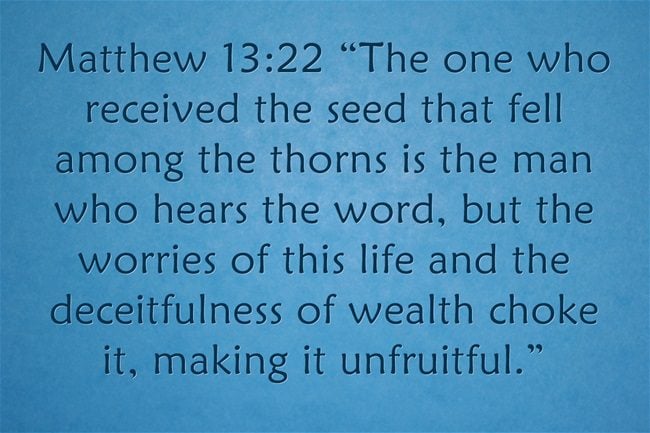Is Gambling Biblical

Answer: Although the words 'gambling' or 'lottery' are not in the King James Version Bible, numerous verses denounce the attitudes that are behind them. They include idol worship and greed, which are the foundations that encourage this kind of behavior.
People often indulge in gambling, be it playing the lottery or going to a casino, because they hope to 'get lucky.' Scripture states that such things as fortune, fate, luck and destiny are as foreign gods in whom the people foolishly place their hope.
While the Scripture does not specifically address the subject of gambling, it provides us with a number of principles that can guide us on this issue. The Bible Speaks On Gambling The following Bible Study is by Dr. Hitchens, President, Maryland Baptist Bible College, and is reprinted from the Maranatha Baptist Watchman, August 1996; used by permission (Maranatha Baptist Church, 3141 Old Elk Neck Rd., Elkton, Maryland 21921).
The Eternal clearly states that not only does not like the attitude behind gambling he is willing to punish people for indulging in such foolishness. Through the prophet Isaiah he states, 'But you who forsake the LORD . . . who prepare a table for Fortune, and who furnish the drink offering to Fate, Therefore I will destine you to the sword; and you will all bow down to the slaughter . . .' (Isaiah 65:11 - 12, HBFV).
- Gambling is inspired by greed. Let’s be truthful and admit that greed lies at the heart of all betting. The desire to get free ride is actually another name for covetousness (Exod. Betting is an inefficient usage of the Lord’s money. I doubt that numerous Christians who gamble tithe, however even Read More →.
- Gambling clearly breaks several biblical principles which are central to a Christian’s way of life. A Christian lifestyle is one that expresses faith in the loving care and provision of Almighty God, not in chance or luck (Matthew 6:33).
The TEV Bible translation of Isaiah 65:11 states that those who reject our Creator worship gods of 'luck and fate,' the two primary characteristics that underpin gambling. A passage in the book of Proverbs states, 'Worthless, wicked people go around telling lies. They wink and make gestures to deceive you, all the while planning evil in their perverted minds . . .' (Proverbs 6:12 - 14, TEV).
The CEV translation states that liars go around 'winking and giving signals' to deceive others. Such signals between people are the same kinds of stereotypical signs often associated with those seeking to tip the gambling odds in their favor.
One of the deceptive beliefs behind gambling is that by making a small 'investment' one can become rich. This attitude leads to what the word of God defines simply as GREED. Games of chance where money is involved also encourages the false notion that a person can get something for nothing. Being greedy is ultimately a waste of time and distracts a person from what is truly important in life.
Someone once stated that the person who dies with the most toys (cars, houses, other possessions) wins at life. It is this type of materialistic drive and the desire to have more that helps fuel an obsession with gambling. The world's wisest man, Solomon, stated several times how foolish is was to pursue riches (Proverbs 23:5, 27:20, 24).
One day a person shouted to Jesus from a crowd asking him for help in dividing a family inheritance between him and his brother. Jesus' sharp, to-the-point response first stated that his purpose on earth was not to be a judge or arbitrator between people to settle their disputes.
The word 'arbitrator' used in the NASB and other translations for Jesus' response in Luke 12:14 come from a Greek word whose meaning is very similar to the word 'destiny' in the Hebrew. Both words have in common the same concept of portioning out or dividing that gambling businesses partake in when they take the wealth of one person and give it to someone else.
Jesus warned the man who screamed for his help to be wary of covetousness (greed) since God never intended a person's life revolve around the accumulation of physical things (Luke 12:15). He then gave what is known as the parable of the foolish rich man who built bigger barns (verses 16 - 21).
The book of Jeremiah also warns us not to be 'greedy for gain' (Jeremiah 6:13, 15). In short, the Bible says that gambling, especially with our hard earned money, is something we should not pursue or indulge in.
Question: 'Is gambling a sin? What does the Bible say about gambling?'Answer: The Bible does not specifically condemn gambling, betting, or the lottery. The Bible does warn us, however, to stay away from the love of money (1 Timothy 6:10; Hebrews 13:5). Scripture also encourages us to stay away from attempts to “get rich quick” (Proverbs 13:11; 23:5; Ecclesiastes 5:10). Gambling most definitely is focused on the love of money and undeniably tempts people with the promise of quick and easy riches.
 What is wrong with gambling? Gambling is a difficult issue because if it is done in moderation and only on occasion, it is a waste of money, but it is not necessarily evil. People waste money on all sorts of activities. Gambling is no more or less of a waste of money than seeing a movie (in many cases), eating an unnecessarily expensive meal, or purchasing a worthless item. At the same time, the fact that money is wasted on other things does not justify gambling. Money should not be wasted. Excess money should be saved for future needs or given to the Lord’s work, not gambled away.
What is wrong with gambling? Gambling is a difficult issue because if it is done in moderation and only on occasion, it is a waste of money, but it is not necessarily evil. People waste money on all sorts of activities. Gambling is no more or less of a waste of money than seeing a movie (in many cases), eating an unnecessarily expensive meal, or purchasing a worthless item. At the same time, the fact that money is wasted on other things does not justify gambling. Money should not be wasted. Excess money should be saved for future needs or given to the Lord’s work, not gambled away.While the Bible does not explicitly mention gambling, it does mention events of “luck” or “chance.” As an example, casting lots is used in Leviticus to choose between the sacrificial goat and the scapegoat. Joshua cast lots to determine the allotment of land to the various tribes. Nehemiah cast lots to determine who would live inside the walls of Jerusalem. The apostles cast lots to determine the replacement for Judas. Proverbs 16:33 says, “The lot is cast in the lap, but its every decision is from the Lord.”
Is Gambling Biblically Wrong
Is Gambling Biblical
What would the Bible say about casinos and lotteries? Casinos use all sorts of marketing schemes to entice gamblers to risk as much money as possible. They often offer inexpensive or even free alcohol, which encourages drunkenness, and thereby a decreased ability to make wise decisions. Everything in a casino is perfectly rigged for taking money in large sums and giving nothing in return, except for fleeting and empty pleasures. Lotteries attempt to portray themselves as a way to fund education and/or social programs. However, studies show that lottery participants are usually those who can least afford to be spending money on lottery tickets. The allure of “getting rich quick” is too great a temptation to resist for those who are desperate. The chances of winning are infinitesimal, which results in many peoples’ lives being ruined.Can lotto/lottery proceeds please God? Many people claim to be playing the lottery or gambling so that they can give the money to the church or to some other good cause. While this may be a good motive, reality is that few use gambling winnings for godly purposes. Studies show that the vast majority of lottery winners are in an even worse financial situation a few years after winning a jackpot than they were before. Few, if any, truly give the money to a good cause. Further, God does not need our money to fund His mission in the world. Proverbs 13:11 says, “Dishonest money dwindles away, but he who gathers money little by little makes it grow.” God is sovereign and will provide for the needs of the church through honest means. Would God be honored by receiving donated drug money or money stolen in a bank robbery? Of course not. Neither does God need or want money that was “stolen” from the poor in the temptation for riches.
First Timothy 6:10 tells us, “For the love of money is a root of all kinds of evil. Some people, eager for money, have wandered from the faith and pierced themselves with many griefs.” Hebrews 13:5 declares, “Keep your lives free from the love of money and be content with what you have, because God has said, ‘Never will I leave you; never will I forsake you.’” Matthew 6:24 proclaims, “No one can serve two masters. Either he will hate the one and love the other, or he will be devoted to the one and despise the other. You cannot serve both God and Money.”